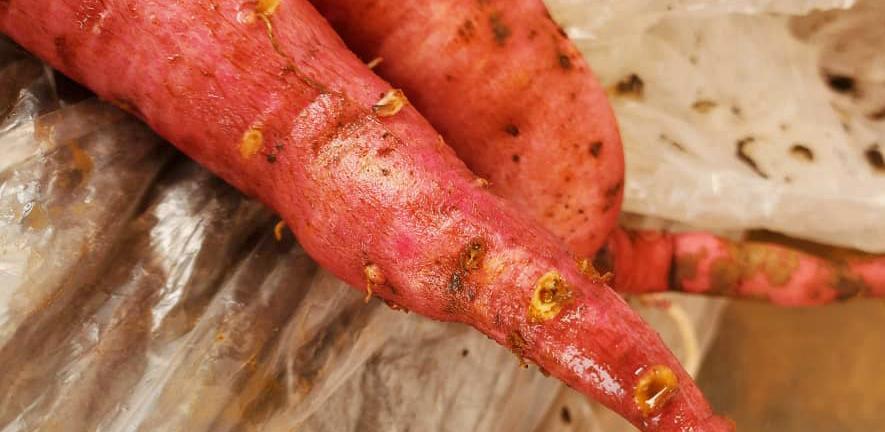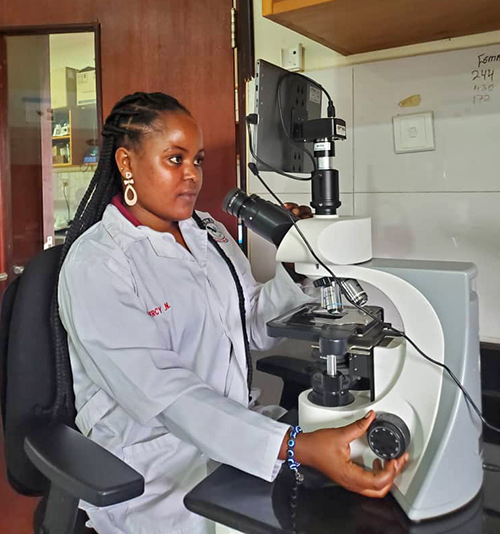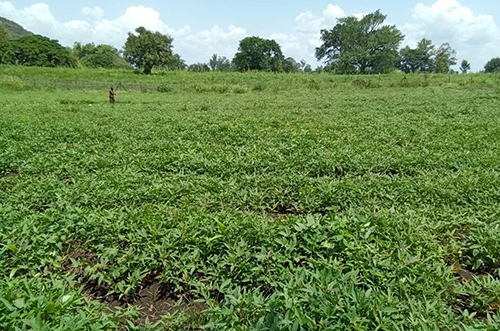
Submitted by Anonymous on Thu, 23/11/2023 - 14:21
New Cambridge-Africa Alborada grants to help boost pathogen responses in African nations
The department is delighted by the award of two new grants that will enable our researchers to contribute to sustainable crop and food system development in East and West Africa. Funded by the Cambridge – Africa Alborada research fund, the two grants will facilitate development of long term capacity and expertise to evaluate root knot nematode resistance in sweet potatoes in Uganda, and train ten scientists from West Africa in Nanopore technology, to boost capacity to screen cassava and yam for damaging viruses.
Project 1: Expertise and infrastructure for nematode resistant sweet potato in Uganda
Sweet potato is grown by over 40% of Uganda’s farmers and is the fourth most important staple crop in the country, along with banana, maize and beans. It is a very adaptable crop, thriving in nutrient rich and poor environments, and requires little input for growth. However, farmers suffer significant yield losses.
Since 2021, scientists in the department’s Crop Pathogen Immunity and Plant Pathogen/Parasite Interactions research groups, working with the International Institute of Tropical Agriculture and the National Crops Resources Research Institute in Uganda, have been studying the nature and extent of the possible involvement of root knot nematodes (RKN) in this yield drop.
In an initial study they found that 20% of the samples collected in twelve leading sweet-potato growing districts of the country were infested with Meloidogyne incognita nematodes.
Unfortunately, further studies to understand the strains involved and develop opportunities for breeding resistant varieties are hampered by the lack of capacity in Uganda to identify and manage such infestations.
New grant will help fill knowledge gaps
The new grant from the Cambridge – Africa Alborada research fund will enable scientists to help fill these infrastructure and expertise gaps by funding a new project, titled 'Spurring development of root knot nematode Meloidogyne incognita resistance in sweet potato germplasm for food security in Uganda'.
With the long-term aim of facilitating the development of root knot nematode-resistant varieties of sweet potato for smallholder farmers, the project will:
• Identify the strains of root knot nematodes in Uganda and develop a protocol for screening RKN resistance under Ugandan conditions.
• Screen and map Ugandan varieties of sweet potato for resistance to root knot nematode.
• Establish a root knot nematode data and expertise centre/platform in Uganda.
• Train scientists to develop the centre and enhance root knot nematode research capacity in the country.
NARO currently uses 140 sweet potato founder lines as parental genotypes for population improvement and variety development. The project will produce a catalogue of these varieties’ resistance to RKN and will select suitable resistant genotypes for use in breeding and improvement programmes.
“The impact of underground nematodes is often overlooked. Understanding their prevalence will allow us to address the challenges they pose to agriculture and help us develop better targeted and more effective treatments. Working together with colleagues in Uganda allows us to combine our strengths and expertise to tackle these damaging pathogens in-country, and we will be able to share our discoveries throughout the East Africa region,” said Lida Derevnina, head of the Crop Pathogen Immunity group, and co-leader of the project.
Together, the protocol, the catalogue, the data and expertise platform and the scientific research capacity improvements the project will create are expected to make a notable contribution to Uganda’s ability to manage and develop its response to RKN, and to boost its food security in the longer term.
"This new project perfectly exemplifies the greater ambition of the department’s Crop Science Centre to help accelerate the world's transition to more sustainable and equitable agriculture but finding local solutions to understudied problems, and where they are needed most," said Sebastian Eves-van den Akker, head of the Plant Pathogen/Parasite Interactions group.
Project 2: Oxford Nanopore Technology training in West Africa
This new training course project, titled ‘Oxford Nanopore Technology - next-generation sequencing for young West African scientists’ will focus on the detection, diagnosis and identification of plant virus diseases of cassava, yam and sweet potato, which are key crops in the region and are most threatened by aphid- and whitefly-transmitted plant viruses, which vastly decrease the yields of both vital crops. The course will be coordinated by the department's Virology and Molecular Plant Pathology group.
Nanopore sequencing allows rapid portable high-throughput DNA and RNA sequencing that can accelerate our understanding of fundamental plant-virus interaction as well as form the cornerstone of comprehensive pan-regional surveillance systems that actively monitor virus incidence and identify the emergence of potential viral epidemics, thus allowing timely management responses. The course will equip ten graduate students and young post-doctoral scientists from across West Africa with the expertise to incorporate next generation sequencing into their own research and contribute to food security in the region.
[All images by kind courtesy of Benard Yadas, NaCCRI, Uganda]


